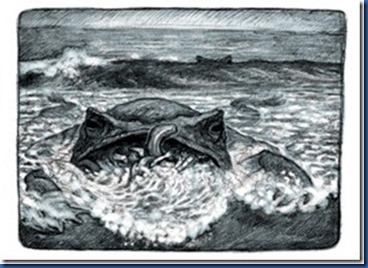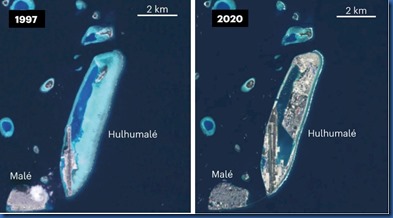The Maldives has been a poster child for the devastating impact of climate change. The image of an entire nation sinking into the depths of ocean captures the imagination like the tales of Atlantis. Newsweek recently published an article titled “We Are all Maldivians” which asserted:
- “If the Maldives sinks, it will also be time up for hundreds of millions of people who live in low-lying areas across the world.”
Article co-author former President Mohamed Nasheed is responsible for bringing the “sinking” meme to the world’s attention. It all started with a brilliant publicity stunt of holding a cabinet meeting underwater, and spread with Nasheed’s evangelical global advocacy for climate action.
First of all, let’s dispense with the semantic nicety that the Maldives are not “sinking” in the notion of their altitude getting close to the Earth’s centre. The land level is not dropping to any tectonic subduction, but rather the sea level is rising making the relative elevation above sea-level lower.
Nasheed’s piece cites a paper suggesting a sea-level rise of nearly 19mm per year, but recent data estimates that sea-levels are rising at a rate of 3.6mm per year [Royal Society]. This rise is the result of two main impacts of global warming: (a) melting Arctic land ice (eg. Greenland, Antarctica), and (b) expanding size of water at higher temperatures. The average elevation of the Maldives is 1600mm. So at the current rate of sea level rise, the Maldives won’t be mostly “sunk” for another 400 years. By which time, other problems like global famine and extreme weather events are much more likely to have decimated welfare more than the available land above water.
The ”sinking” calculations also assume that the Maldivians stand around passively and do nothing. They might not be able to unboil the ocean, but they can change the elevation of their country. In fact, despite rising sea levels of recent years, net Maldivian elevation has actually risen. Like the low lying ‘lands of nether” centuries before, Maldives has aggressively pursued efforts of terraforming which basically make islands out of ocean (as opposed to ocean out of islands when they sink) by dredging up landfill from the bottom of the ocean. In recent years, the country added over 432 hectares with the development of Huhumale island, and the president just recently announced the Ras Male project to add another 1,150 hectares (see photo below) with another major project in the Addu atoll aming to add 252 hectares. In the battle between rising seas and rising land, the land is winning.
Let me be clear…I am not denying climate change. The evidence that I have examined extensively does clearly show that (a) climate is changing, (b) this change’s speed is unprecedented in human history (limiting society’s ability to adapt in time), and (c) human activity (especially burning hydrocarbons) is the major contributor. Nor am I denying sea level rise. The oceans are rising and will continue to do so with climate change.
Why such pedantic distinctions? First of all, exacting accuracy matters in issues of science. By glossing over details, the climate activists expose themselves to the climate deniers who point out their minor errors and equate them to undermining all of science’s claims (the rhetorical term is “false equivalence”). Furthermore, people might end up fearing (and fighting) the wrong outcome. With limited political will (and hence public sector budget) to counter climate change, picking the right battles is important.
I am reminded of a passage from the book, “The World According to Garp” that an aquatic destination like the Maldives will appreciate:
- “He stood ankle-deep in the foam from the surf and peered into the waves, without taking a step, for the longest time. The family went down to the water’s edge to have a word with him. ‘What are you doing, Walt?’ Helen asked…’I’m trying to see the Under Toad,’ Walt said. ‘The what? said Garp.’ ‘The Under Toad,’ Walt said, ‘I’m trying to see it. How big is it?’ And Garp and Helen and Duncan held their breath; they realized that all these years Walt had been dreading a giant toad, lurking offshore, waiting to suck him under and drag him out to sea. The terrible Under Toad.”
What are the real “undertows” in the treacherous waters of climate change (as opposed to the “under toad” distractions)?
- Severe weather events – Even flooding in the Maldives is not from daily sea levels encroaching, but instead the result of surges from severe storms (eg. “Study highlights complex causes of Maldives flooding”. Warmer air and water temperatures intensify the concentration of humidity and energy in the atmosphere which create bigger and stronger storms.
- Death of the oceans – The death of ocean is the death of the Maldives since that country is 99.97% ocean. Its two main industries are tourism and fishing. And both depend on the ocean. Tourism first started entirely predicated on the allure of its ocean as a diver’s paradise. Over time, the appeal grew to more of an over water experience with water villas, over-water spas, over-water restaurants, etc. The ecological change in the marine life of the oceans will have a more dramatic effect on the lives of Maldivians more intensely and more immediately than its average elevation.
The aboriginal Maldives was mill-pond calm lagoons with crystal clear waters and teeming with colourful tropical fish darting amongst colourful corals. With warmer waters comes the bleaching and demise of the corals, and the knock-on drop in fish populations. And it’s not just underwater, but over water the increased temperatures bring increased winds frothing up the water and disturbing the sought after tranquility. Land reclamation might counter millimeter level rises in sea level, but not powerful and large ocean surges from increasingly powerful tropical storms. Like Walt’s ocean fear, people are fearing the “under toad” of “sinking” instead of the very real “undertow” of severe weather and dying coral reefs.
[POSTSCRIPT] These points underscored by this article “Nearly 1,000 disappearing islands in Maldives growing in size, surprising experts“:
- “If reports are to go by, when researchers analysed decades of aerial photos and satellite imagery, they came across an intriguing trend: Most islands have remained stable or even increased in area.”


